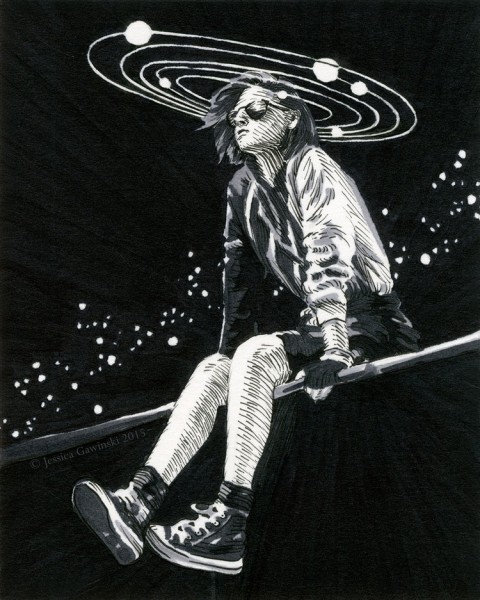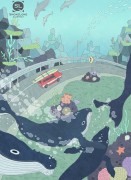My best friend Shelly came back from dance camp in Boston wearing a Kriss-Kross t-shirt and acting like she discovered Jimi Hendrix. She spent the rest of summer telling me that black guys were way hotter than white guys. There weren’t any black guys in our town but that didn’t keep her from getting pregnant by October.
She had to drop out of dance classes in February, when she couldn’t hide it anymore. Shelly had been the best dancer at our studio and Ms. Martin said it was a real shame, that Shelly could have had a future in dance. “Let that be a lesson to you girls,” she said.
Our recital had already been choreographed so Ms. Martin had to reconfigure everything to hide the hole that Shelly left. Her mother still had to pay for her costumes, the sequins and tulle that didn’t fit anymore.
Shelly and Gregg got an apartment on Chestnut Street: the back half of the second floor of an old Victorian. I visited her a week after she had the baby. The crib was in the living room, where you might expect a television to be, across from the sofa that was previously in her parents’ basement, where we used to sneak sips of vodka and gin. But in her new life, we sat on the sofa and stared at the crib, at the tiny baby wrapped tightly in a blanket.
“It’s called swaddling,” Shelly said. She took Kayla out of the crib, uncoiled the blanket and wrapped her up again to demonstrate. She seemed proud of herself, so I said “great job.” I couldn’t wait to get out of there, out of that hot apartment and away from the pink-faced baby. When Shelly lifted up her Kriss-Kross t-shirt and pulled out her ginormous boob to feed Kayla, I said it was getting late and I had to go home to pack.
I was leaving for dance camp in the morning. Shelly didn’t mention it but she knew I was going. I ran into her mother at the grocery store and she told me she heard from Ms. Martin that I’d been accepted. I hadn’t gotten in the summer before. Shelly’s mother placed her hand on my shoulder and said, “Good for you.” Then she got a sort of weird look and said, “Maybe if you’d gone last year, instead of Shelly, things would have turned out differently.” I didn’t know if she meant that Shelly wouldn’t have gotten pregnant with Gregg’s baby, or that I would have instead, making me the cautionary tale for the other girls. That summer I may have let a few boys feel me up, but Shelly was the only one having sex in the backseat of a car.
My parents drove me to Boston and carried my bags to the dorm room at the university. “Maybe you’ll want to go to college here,” my dad said. He was already making a list of schools to tour in September.
I was surprised to find a letter waiting for me with my registration packet. I recognized Shelly’s handwriting and stuffed it in my back pocket so my parents wouldn’t see it.
After they left, I took the letter out. Shelly wished me luck at camp and asked me to write about the teachers and dancers she knew from last summer. She asked me not to tell anyone why she wasn’t there this year. We wrote to each other every few days for two weeks. Her letters were light and carefree, as if she was spending the summer at the lake and not at home with her baby sucking on her nipples. I didn’t tell her that nobody at camp asked about her. Instead, I wrote about the blisters on my feet from pointe class and the rumors that one of the girls was sleeping with the modern dance teacher.
Her last letter was thick, the paper folded in half twice. She wrote about everything I suspected: she didn’t love Gregg, didn’t want to live with him and certainly didn’t want to marry him. She wanted to finish school, to dance again. She wished she could take all of it back, the nights with Gregg in the back of his car after football games, the Jimi Hendrix tape she’d given him, “Foxy Lady” the soundtrack to their backseat groping. She said she was going to run away and leave Kayla with Gregg. She asked me to meet her at the train station on Summer Street on Wednesday at six p.m. She’d be there, she wrote. And things will be like they used to be. She could nearly fit back into her leotards.
I didn’t go to the bus station on Wednesday. Instead, I went shopping with some girls from dance camp. I bought a pair of bell-bottom jeans at a thrift shop and we all bought the same shade of lipstick at Rite-Aid: Forever Fuchsia.
Two weeks later I was home and hoping to avoid Shelly. My mother sent me to the grocery store to pick up steaks for dinner. Shelly was working at the checkout lane. I put the steaks on the conveyor belt, staring at the red flesh wrapped in cellophane.
I was wearing my new jeans and a black leotard, my hair pulled tightly into a bun, my lips stained forever fuchsia—I felt sorry about that, like I was rubbing everything in her face. I passed her a twenty-dollar bill and she pressed some keys on the cash register. I knew she hadn’t taken the bus to Boston, that she hadn’t been waiting for me there. Shelly counted the change, placing the bills and coins onto my palm.
“Paper or plastic?” she asked. I should have said something, maybe asked about the baby, but the woman behind me put her basket down. Shelly scanned a box of Lucky Charms. I picked up the steaks and left.



 The core workshop of SmokeLong Fitness is all in writing, so you can take part from anywhere at anytime. We are excited about creating a supportive, consistent and structured environment for flash writers to work on their craft in a community. We are thrilled and proud to say that our workshop participants have won, placed, or been listed in every major flash competition. Community works.
The core workshop of SmokeLong Fitness is all in writing, so you can take part from anywhere at anytime. We are excited about creating a supportive, consistent and structured environment for flash writers to work on their craft in a community. We are thrilled and proud to say that our workshop participants have won, placed, or been listed in every major flash competition. Community works.